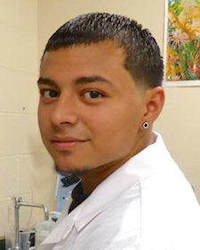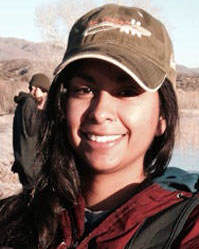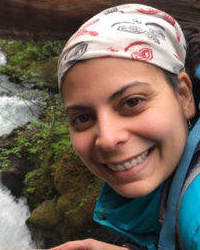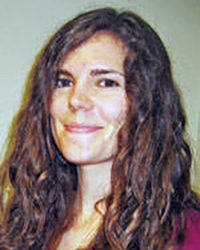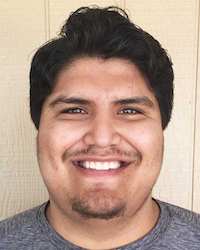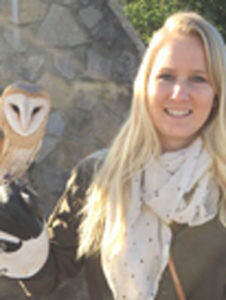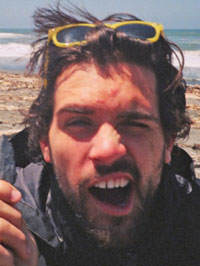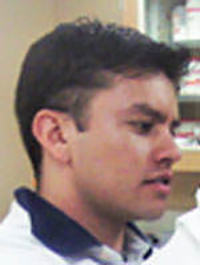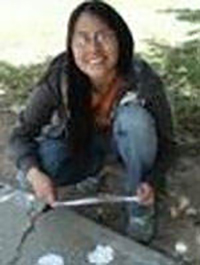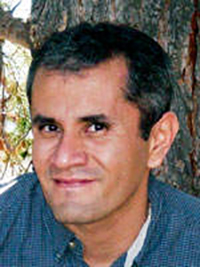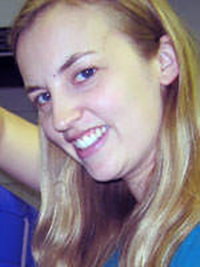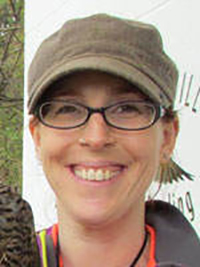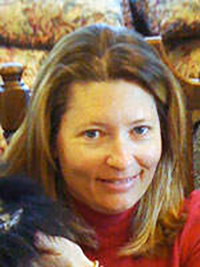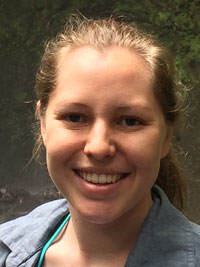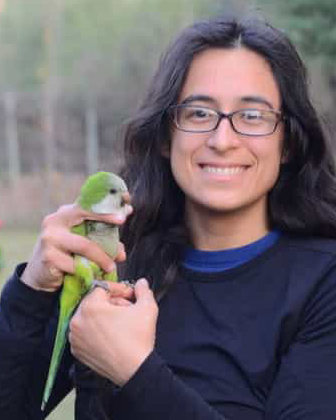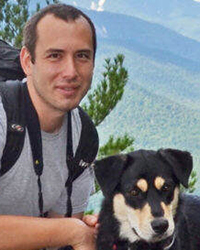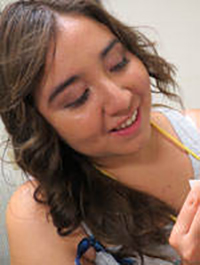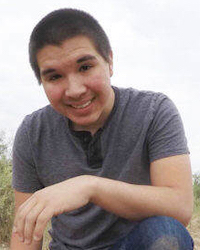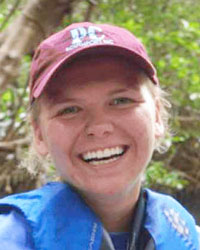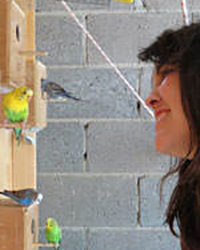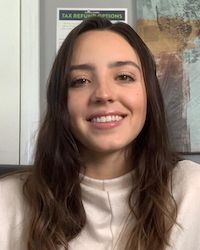 Timothy F. Wright
Timothy F. Wright
Department of Biology
New Mexico State University
(575) 646-1136
email
People
Wright Lab Fall 2022
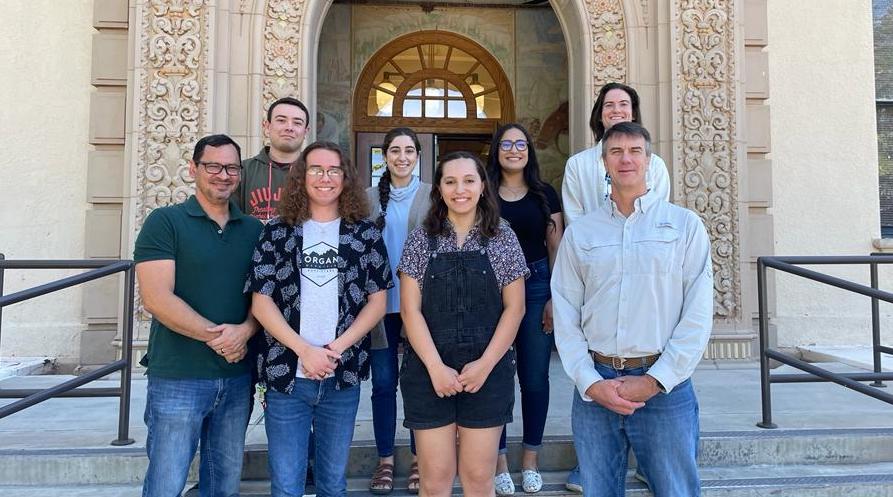
Top L-R: Victor Baquera, Bushra Moussaoui, Alondra Villalba, Alexander Allison Bottom L-R: Brian Ramos-Güivas, Kennedy Ulmer, Kayla Moehn, Tim Wright
Not Pictured: Dominique Hellmich, Greg Gedman, Dylan Osterhaus, Scott Boyle, Jodie Jawor
Lab Head

Dr. Timothy F. Wright
Principal Investigator (CV PDF)
(575) 646-1136 | wright@nmsu.edu
Ph.D.: University of California San Diego
B.A. Dartmouth College
Post-doctoral work: University of Maryland, Smithsonian Institution
Evolution of vocal learning and communication signals
I am broadly interested in the evolution of vocal learning and communication signals. Much of my work has focused on the parrots because of their well-developed learning abilities and the interesting contrasts they pose in behavior, ecology, and life history patterns to the better-known songbirds. Early work focused on describing vocal repertoires in selected parrot species and investigating patterns of geographic variation known as vocal dialects. Of particular interest was the contrast between patterns of vocal variation among populations, driven by cultural evolution, and patterns of genetic variation.
This work has included fieldwork on the yellow-naped amazon in Costa Rica and the thick-billed parrot Mexico. In the last five years I have taken a broader, comparative approach that includes extensive molecular work on the evolutionary relationships among parrots and the use of the resulting phylogenies to investigate questions regarding life history, longevity, and mitochondrial genome evolution. Most recently, I have begun a collaborative project to examine the neural and endocrine mechanisms underlying vocal learning in adult and juvenile captive budgerigars. Finally, the serious conservation issues faced by parrots inform much of the work I do; my conservation actions include coordinating a multi-year education programs in Costa Rica, conducting surveys of genetic and vocal diversity of the endangered thick-billed parrot of Mexico, investigating patterns of invasion in the monk parakeet, and engaging in public outreach and education.
For a more detailed description of ongoing research programs see the Research Page.
For a complete list of publications and links to selected pdf files of papers see the Publications Page.
Selected Publications
Wright*, T.F., J.R. Eberhard*, E.A. Hobson, M.L. Avery & M.R. Russello. 2010. Behavioral flexibility and species invasions: the adaptive flexibility hypothesis. Ethology Ecology & Evolution.22:393-404. *both authors contributed equally to this work.
Guerra, J. E., J. Cruz-Nieto, S.G. Ortiz-Maciel & T.F. Wright. 2008. Geographic variation in the contact calls of the thick-billed parrot. Condor. 110:639-647.
Wright, T.F., E.E. Schirtzinger, T. Matsumoto, J.R. Eberhard, G.R. Graves, J.J. Sanchez, S. Capelli, H. Müller, J. Scharpegge, G.K. Chambers and R.C. Fleischer. 2008. A multi-locus molecular phylogeny of the parrots (Psittaciformes): Support for a Gondwanan origin during the Cretaceous. Molecular Biology and Evolution. 25:2141-2156.
Wright, T.F., C.R. Dahlin, A. Salinas-Melgoza. 2008. Stability and change in vocal dialects of the yellow-naped amazon. AnimalBehaviour. 76:1017-1027.
Wright, T.F., A.M. Rodriguez & R.C. Fleischer. 2005. Vocal dialects, sex-biased dispersal and microsatellite population structure in the parrot Amazona auropalliata. Molecular Ecology. 14:1197-1205.
Wright, T.F., C.A. Toft , E. Enkerlin-Hoeflich, J. Gonzalez-Elizondo, M. Albornoz, A. Rodríguez-Ferraro, F. Rojas-Suárez, V. Sanz, A. Trujillo, S.R. Beissinger, V. Berovides A., X. Gálvez A., A.T. Brice, K. Joyner, J.R. Eberhard, J. Gilardi, S.E. Koenig, S. Stoleson, P. Martuscelli, J.M. Meyers, K. Renton, A. M. Rodríguez, A C. Sosa-Asanza, F.J. Vilella, & J.W. Wiley. 2001. Nest poaching in Neotropical parrots. Conservation Biology. 15:710-720.
An article in Science News features our work on dialects in the yellow-naped amazon: Not Your Father’s Song, by Susan Milius (Nov. 8, 2008).
Affiliate Scientist
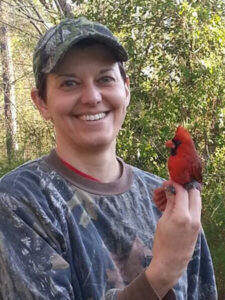
Dr. Jodie Jawor
(CV PDF)
Affiliate Scientist
jjawor@nmsu.edu
My research interests lie in behavioral endocrinology which allows me to ask both proximate and ultimate questions regarding behaviors we see in non-human animals. My interests lie in asking questions about why (ultimate questions) a behavior is shown; what is the benefit to the individuals showing this behavior in terms of longevity or reproductive success? Then, how is the behavior facilitated (proximate questions) physiologically? I focus most strongly in the area of endocrinology and my work has focused most strongly on the steroid hormones (e.g., testosterone, corticosterone) and how these hormones impact behaviors such as aggression and parental care, or aspects of appearance that impact reproductive success, such as plumage coloration in birds. My past work has investigated the impacts of testosterone on aggressive behavior in female Dark-eyed Juncos (Junco hyemalis); the impacts of testosterone on parental care in both sexes of Northern Cardinals (Cardinalis cardinalis); and the function of multiple ornaments in both sexes of cardinals during intra- and inter-sexual interactions. While in the Wright lab I will be working on the impacts of corticosterone on vocal learning in adult Budgerigars (Melopsittacus undulates) as individuals navigate social situations (acquiring a new mate, joining a new flock); both of which can cause ‘stress’. The hormone corticosterone is one of the classic stress hormones and has been shown to have both negative and positive influences on learning, but all the steps in this process are not known and we hope to provide a better understanding of how this particular hormone functions in the process of learning.
Postdoctoral Researcher
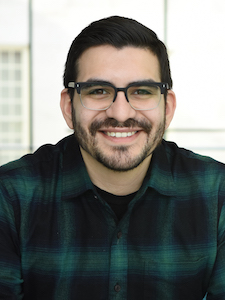
Dr. Gregory Gedman
NSF Postdoctoral Researcher
LinkedIn Profile
Greg is a postdoctoral researcher studying the genetic drivers of vocal imitation in songbirds, parrots, and humans. He received his Ph.D. from Rockefeller University in Erich Jarvis’ Laboratory for Neurogenetics of Language. Here, he found numerous genes showing parallel expression in the vocal production neural pathways of vocal learning birds and humans. Now in the Wright lab, he is further exploring one of these candidate genes, the transcription factor ZEB2, to better understand its role in the formation and function of vocal imitation brain circuitry across species, including budgerigar parakeets. This work is supported by a Postdoctoral Research Fellowship in Biology award from the National Science Foundation. Outside the lab, Greg enjoys long distance running, comic books, and lounging with his bulldog.
Graduate Students
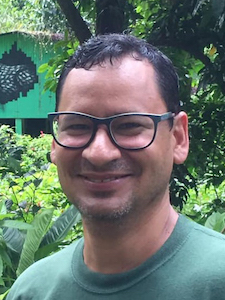
Brian Ramos Güivas
PhD student (CV PDF)
brianrg@nmsu.edu
M.A. University of Puerto Rico Mayagüez 2013
B.S. University of Puerto Rico Mayagüez 1999
Psittascene WPT Publication
Glucocorticoids paper Publication
Facebook Proyecto de Conservación Cotorra Puertorriqueña de Rio Abajo
My interest in research is on applied behavior and physiology for conservation. Mainly focused on the reproduction aspect of monogamous parrot species. For my Ph.D., I am studying how glucocorticoids, vocalization, and parental care strategies relate to reproductive success in an endangered parrot species. I think that the more we know about the species we are trying to save the better the chances of success. My model species is the Puerto Rican parrot (Amazona vittata), a critically endangered species. The program for the recuperation of the species provided an excellent platform to test the different aspects of my interest and an opportunity to compare different populations and the effect of captivity on reproductive success.
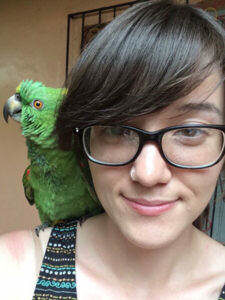
Dominique Hellmich
PhD student (CV PDF)
B.A. (Biology) Cornell University, 2015
Research Interests: Animal communication, evolution of cognition, causes of individual variation in cognitive abilities, behavioral flexibility
I use invasive rosy-faced lovebirds (Agapornis roseicollis) living in Phoenix, AZ as a model system to investigate questions related to the causes and consequences of individual variation in the cognitive abilities of wild animals. Often it is assumed that traits like increased brain size or behavioral flexibility positively influence the fitness of animals living in rapidly changing or novel environments. However, empirical data explicitly linking individual differences in cognition or neuroanatomy to fitness outcomes in wild animal populations is severely lacking. With my research I look to begin addressing this gap in our knowledge by measuring the reproductive success of lovebirds in the wild so that these data can be correlated to individual measures of behavioral flexibility and the expression of neural glutamate receptors implicated in learning and memory processes. By focusing on individual-level variation in cognition rather than differences between populations I seek to better understand how cognitive abilities related to behavioral flexibility are developed and evolve in a natural context.

Alondra Villalba
PhD student
alondra5@nmsu.edu
B.S Biology, Northern New Mexico College
Research Interests: Vocal learning, chronic stress, early life stress, physiological stress response, glucocorticoids.
I am interested in better understanding how chronic stress affects vocal learning using the budgerigar, a small parrot, capable of learning new vocalizations during its entire life. I am especially interested in investigating how early life stress impacts an individual’s ability to cope with chronic stress experienced later in life. Birds share highly conserved learning pathways with humans, therefore our studies will aid in improving our understanding of how chronic stress affects adult language learning in humans.
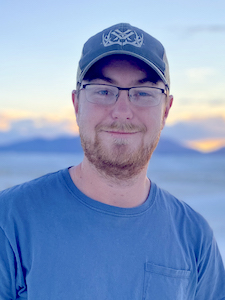
Dylan Osterhaus
PhD Student (CV PDF)
M.S. (Fisheries Biology) Iowa State University, 2021
B.S. (Biology) Emporia State University, 2019
ResearchGate Website
To this point, my research has focused broadly on the implications of anthropogenic alteration of the natural environment for a variety of taxonomic groups including fishes, birds, and mammals. At NMSU, my project is focused on documenting the interaction of migrating birds with artificial light at night at a fine scale using acoustic analysis of flight calls and the quantification of migration using weather radar. This work involves the collection of large datasets of acoustic recordings, which will be analyzed using pre-trained machine learning algorithms for nocturnal flight call detection and classification. With help from collaborators from the Department of Defense, Cornell Lab of Ornithology, and Colorado State University, we hope to determine whether migrating birds are attracted to small sources of artificial light at night in otherwise dark environments. Additionally, I am interested in using weather radar to examine how anthropogenic alterations of water availability in river corridors of the American West may be altering stopover use of these habitats by migrating birds.
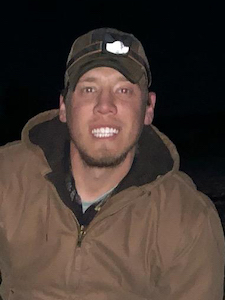
Scott Boyle
PhD Student (CV PDF)
sboyle@nmsu.edu
Advisors: Dr. James Cain, Dr. Timothy Wright, and Dr. Fitsum Abadi Gebreselassie
B.S. Colorado State University, 2018
My research interest includes applied wildlife management and conservation of terrestrial wildlife and quantitative ecology. I am specifically interested in furthering our knowledge of habitat selection, predator-prey theory, population modeling, spatial ecology, animal behavior, and the incorporation of Bayesian statistical models.
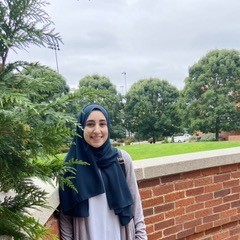
Bushra Moussaoui
MS student
Honors B.S. (Biology) Oregon State University, 2019
Research Interests: Avian communication, vocal learning, age effects on cognition & sociality.
In open-ended vocal learners—such as humans and parrots—the ability to produce new, socially learned vocalizations is not restricted to early development and instead continues into adulthood. Exactly how open such open-ended learning is remains unclear. I am conducting a study using naturalistic flocks of budgerigars (Melopsittacus undulatus) to ask 1) whether open-ended learning diminishes with increasing adult age as is typical of cognitive traits, 2) how aging effects on social integration might impact this socially learned behavior, and 3) whether age-related differences in vocal learning can be explained by underlying neural expression patterns of a key vocal plasticity related gene.

Alexander Allison
MS student (CV PDF)
Honors B.S. (Biology) University of Massachusetts – Amherst, 2022
xangrey@nmsu.edu
Research Interests: Conservation and biodiversity action, avian communication, land management, environmental education
I am passionate about the ability of birds to ignite conservation research. My current work focuses on the critically endangered Great Green Macaw (Ara ambiguus), a flagship species in Central and South America with important roles in both ecological and social spheres. This species is declining throughout its range, and little is known about natal dispersal, a particularly vulnerable life-stage. To fill this knowledge gap, I aim to understand how juveniles spatially integrate into local populations post-fledging. Additionally, my interest in avian communication has led to formation of a second project objective, where I aim to describe patterns of vocal development, social association, and flock formation in juvenile Great Green Macaws. My study area is in northern Costa Rica and I am in collaboration with a local conservation NGO, the Macaw Recovery Network.
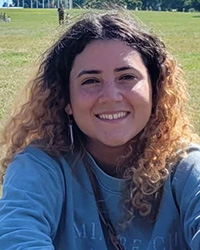
Coral Matos-Sepulveda
MS student
B.A. College of the Atlantic 2020
coralm@nmsu.edu, coralmatos8@gmail.com
Advisors: Dr. Abby Lawson, Dr. Timothy Wright, and Dr. Dan Collins (USFWS)
My main interests are in waterbird habitat use, migration, and conservation. The M.S. project I will be working on focuses on Mexican ducks and other dabbling ducks use of stock tanks or diked wetlands. The field work will be conducted in southeastern Arizona during the winter months. Selected ducks will be marked with satellite transmitters to better understand their movement patterns. I will also be a part of NMSU’s new Avian Migration Program.
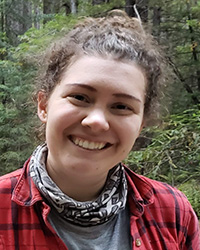
Whitney Watson
PhD Student
M.S. (Wildlife Ecology) University of Wisconsin – Madison; B.A. (Biology) Macalester College
I am broadly interested in spatial and population ecology of avian species as it pertains to wildlife conservation. Currently, I am investigating the ecology of rosy-finches in northern New Mexico using long term datasets in collaboration with USFWS, NMDFG, and Rio Grande Bird Research LLC. I aim to estimate survival and abundance using mark-recapture data, evaluate RFID technology as a monitoring tool, and use stable isotope techniques to examine migration and trophic ecology of rosy-finches.
Undergraduate Students
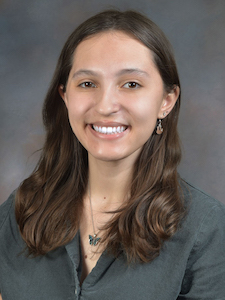
I am interested in learning about how genes and the environment shape behavior. In particular, I am working with PhD Student Alondra Villalba to understand how stress impacts neural gene expression throughout life. Ultimately, we are using the budgerigar, a lifelong vocal learner, as a model to understand how stress and the consequent changes in neural gene expression might impact vocal learning abilities.

Victor Baquera
Undergraduate Researcher
vicbaq@nmsu.edu
My research interests include animal behavior and onboard microphone recording of bird calls using microphone backpacks. I am currently working on developing a backpack harness to carry a microphone for use on budgerigars, Melopsittacus undulatus. This project will allow for higher quality recordings of bird calls with a less intensive set-up. In the future I hope to further my research into developing methods to track birds in three-dimensional space to make gathering social behavior and kinematic data easier.
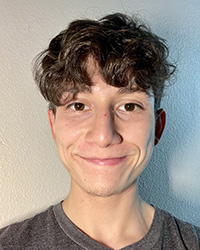
Justin Sanchez
Undergraduate Researcher
justinas@nmsu.edu
I will be conducting avian migration research under Dr. Timothy Wright during the 2023 spring semester. I am extremely interested in understanding animal behavioral dynamics as it relates to population phenomena like migration to be better suited in informing big-picture management techniques for diverse ecological communities someday.
Lab Tech

Kennedy Ulmer
Laboratory/ Research Technician
B.S. (Biology) New Mexico State University, 2022
I graduated in Spring 2022 with a Bachelor’s of Science in Biology from NMSU. During my time as an undergrad, I was in several musical ensembles (including, but not limited to, the marching and pep bands) and worked in an organic chemistry lab synthesizing CBD derivatives. Currently, I am working with the Wright Lab as a technician where I work with budgerigars (Melopsittacus undulatus). I have done immunohistochemistry on budgie brains and counted FoxP2 (transcription factor associated with vocal plasticity) expression within neural cells. I have also worked with the budgies directly for an experiment that looks at how stress affects vocal plasticity. In addition to this, I help maintain the lab and care for the budgies.
Alumni
Former Undergraduate Research Assistants at NMSU
Arthur Anaya
Ana Berglund
Elisa Boyd
Ira Brown
Keely Brown
Lorena Cabada-Gomez
Ana Cadena
Diana Carilla
Dawn Charley
Hugo Cobos
June Coughlan
Josh Criswell
Alban Estrada
Luis Fernandez
Alejandra Galindo
Sarah Garcia
Natalie Gomez
Lauren Gonzales
Chelsea Hooper
Shandean Jefferson
Holly Jones
Yung Jones
Tiffany MacIntosh
Patrick MacNamara
Afiwa Midambegbe
Jessica Moore-Garcia
Matthew O’Dell
Meghann Percy
Maryan Pineiro
Emily Phillips
Danielle Robert
Brenda Rubio
Audrey Sager
Zoe Sullenger
Elena Tsentas
Jorge Vargas Leiton
Amanda Zamora
Lab Visitors
The Wright Lab welcomes short-term visits from graduate students and other academics who desire short-term training in sound analysis, genetic techniques or other areas of lab expertise.
Past visitors include:
Igor Berkunsky
CONICET, Universidad Nacional del Centro de la Provincia de Buenos Aires, Argentina
Corina Castro
MS student, California State University, Fullerton
Andrius Pasukonis
MS student, Ecole Normale Superieure of Paris and Pierre et Marie Curie University.
Cristian Montes-Medina
MS student, Universidad Nacional Autónoma de Mexico

XXXXXX
MS student (CV PDF)
Honors B.S. (Biology) Oregon State University, 2019
Research Interests: xxxxx
xxxxxxxxxxxxxx
Select a shortcode
